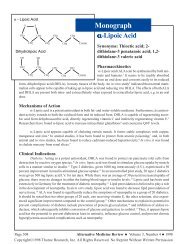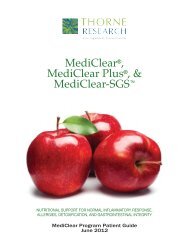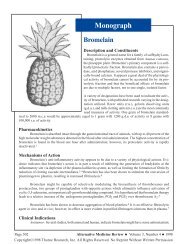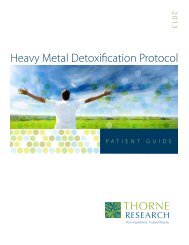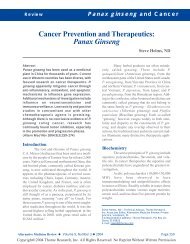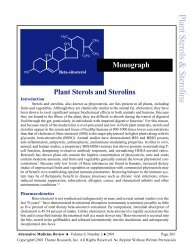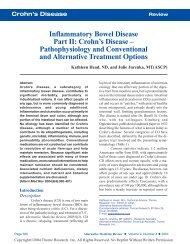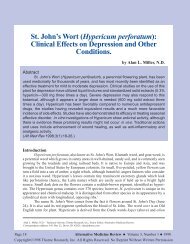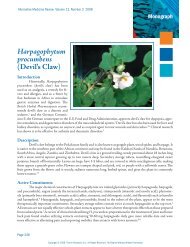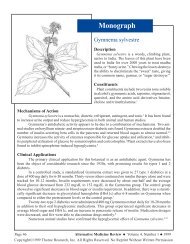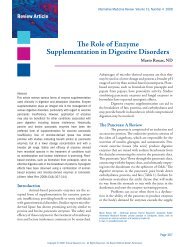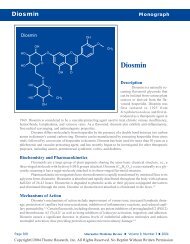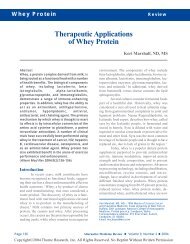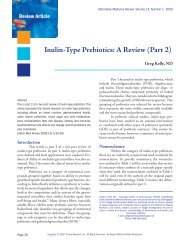Plantago ovata (Psyllium) - Thorne Research
Plantago ovata (Psyllium) - Thorne Research
Plantago ovata (Psyllium) - Thorne Research
Create successful ePaper yourself
Turn your PDF publications into a flip-book with our unique Google optimized e-Paper software.
Monograph <strong>Plantago</strong> <strong>ovata</strong> (<strong>Psyllium</strong>)<br />
the American Heart Association Step-1 diet, then<br />
added eight weeks of psyllium, resulting in decreased<br />
total cholesterol (4.8%) and LDL (8.8%). 20<br />
A meta analysis was performed on eight trials of<br />
psyllium husk in conjunction with a low-fat diet<br />
in the treatment of hypercholesterolemia. After an<br />
initial eight-week, low-fat diet run-in, 10.2 g psyllium<br />
were given per day, resulting in a four-percent<br />
reduction in serum total cholesterol and a<br />
seven-percent reduction in LDL cholesterol, compared<br />
to diet and placebo. A six-percent reduction<br />
in the ratio of apolipoprotein (apo) B to apo A-I<br />
was also noted. 21 Longer trials (16 weeks 22 and 26<br />
weeks 23 ) mirrored the above results.<br />
A meta-analysis of 12 studies of psylliumenhanced<br />
cereal product consumption on total and<br />
LDL cholesterol in 404 adults with mild to moderate<br />
hypercholesterolemia demonstrated a reduction<br />
of total cholesterol and LDL cholesterol of five- and<br />
nine-percent, respectively. 24 <strong>Research</strong>ers studied the<br />
effect of fiber-enhanced cookies on blood lipids in<br />
hypercholesterolemic men, using wheat bran-, psyllium-,<br />
or oat bran-containing cookies (wheat bran<br />
was used as the placebo since it has no demonstrated<br />
cholesterol-lowering effect). At the end of the eightweek<br />
study, plasma LDL cholesterol had decreased<br />
22.6-percent in the psyllium group and 26-percent<br />
in the oat bran group. 25<br />
A four-month study of 12 elderly patients<br />
showed psyllium husk reduced total serum cholesterol<br />
by 20 percent, a figure much higher than the<br />
above-mentioned studies. 26 In another study, a significant<br />
reduction in total serum cholesterol was noted<br />
in 176 elderly persons who used psyllium for one<br />
year. 27 The authors found for every one-gram increase<br />
in daily psyllium dose there was a 0.022-mmol/liter<br />
(0.84mg/dl) decrease in serum total cholesterol concentration.<br />
In the first study to examine age and gender<br />
differences in the effect of psyllium on blood lipids,<br />
men and pre- and postmenopausal women were given<br />
psyllium (15 grams daily) or placebo. <strong>Psyllium</strong> lowered<br />
plasma LDL cholesterol by 7-9 percent in all<br />
groups. Triglyceride levels were lowered by 17 percent<br />
in men, but were increased by 16 percent in<br />
postmenopausal women. Premenopausal women<br />
displayed no significant shift in triglycerides. 28<br />
Diabetes mellitus<br />
The effect of psyllium husk was studied<br />
in 34 men with type 2 diabetes and hypercholesterolemia<br />
given either placebo or 5.1 g psyllium<br />
twice daily for eight weeks. Total cholesterol was<br />
lower by 8.9 percent and LDL by one percent. In<br />
addition, the postprandial rise of glucose was significantly<br />
reduced. 29<br />
Drug-Botanical Interactions<br />
Changes in plasma drug levels have not<br />
been noted. One study in female rabbits showed<br />
that while guar gum reduced the absorption of<br />
ethinylestradiol, psyllium actually slightly increased<br />
the total absorption, but caused a slower<br />
absorption rate. 30<br />
Side Effects/Toxicity<br />
No adverse effects of supplementation<br />
with either psyllium seed or husk were noted in<br />
any clinical studies noted in this paper. In many<br />
of the studies there were greater levels of adverse<br />
effects with the placebo. No changes in blood indices<br />
or in vitamin or mineral content were found<br />
in any of those studies (including both meta-analyses).<br />
A 52-week study of 93 healthy individuals<br />
did find there were some small but statistically<br />
significant changes in some measurements of mineral<br />
and vitamin levels and in some hematological<br />
and biochemical parameters. But the authors<br />
note that none were of clinical significance with<br />
the possible exception of reduced levels of vitamin<br />
B12. 31<br />
Dosage<br />
Based on the above studies, the recommended<br />
dosage for psyllium husk ranges from 10-<br />
30 g daily, in divided doses. Starting with a lower<br />
dose and increasing gradually is often recommended.<br />
Keeping well hydrated while taking psyllium<br />
will prevent constipation.<br />
Warnings/Contraindications<br />
Several cases have been published of individual<br />
allergic and anaphylactic reactions to<br />
psyllium, 32-35 so caution must be exercised in this<br />
regard.<br />
Alternative Medicine Review ◆ Volume 7, Number 2 ◆ 2002 Page 157<br />
Copyright©2002 <strong>Thorne</strong> <strong>Research</strong>, Inc. All Rights Reserved. No Reprint Without Written Permission



